Earlier this month, at Hannover Messe, Microsoft Corp. and the BMW Group announced a new community initiative to enable faster, more cost-effective innovation in the manufacturing sector. In manufacturing today, production and profitability can be hindered by complex, proprietary systems that create data silos and slow productivity. The Open Manufacturing Platform (OMP) is designed to break down these barriers through the creation of an open technology framework and cross-industry community. The initiative is expected to support the development of smart factory solutions that will be shared by OMP participants across the automotive and broader manufacturing sectors. The goal is to significantly accelerate future industrial IoT developments, shorten time to value, and drive production efficiencies while addressing common industrial challenges.
Built on the Microsoft Azure industrial IoT cloud platform, the OMP is intended to provide community members with a reference architecture with open source components based on open industry standards and an open data model. In addition to facilitating collaboration, this platform approach is designed to unlock and standardize data models that enable analytics and machine learning scenarios — data that has traditionally been managed in proprietary systems. Utilizing industrial use cases and sample code, community members and other partners will have the capability to develop their own services and solutions while maintaining control over their data.
“Microsoft is joining forces with the BMW Group to transform digital production efficiency across the industry,” said Scott Guthrie, executive vice president, Microsoft Cloud + AI Group. “Our commitment to building an open community will create new opportunities for collaboration across the entire manufacturing value chain.”
With currently over 3,000 machines, robots and autonomous transport systems connected with the BMW Group IoT platform, which is built on Microsoft Azure’s cloud, IoT and AI capabilities, the BMW Group plans to contribute relevant initial use cases to the OMP community. One example is the company’s use of their IoT platform for the second generation of its autonomous transport systems in the BMW Group plant in Regensburg, Germany, one of 30 BMW Group production and assembly sites worldwide. This use case has enabled the BMW Group to greatly simplify its logistics processes via central coordination of the transport system, creating greater logistics efficiency. In the future, this and other use cases—such as digital feedback loops, digital supply chain management and predictive maintenance—will be made available and, in fact, developed further within the OMP community…
This article first appeared at Microsoft News Room
Tech content on this site may include contributed articles and partnerships with industry voices. Learn more in our Editorial Policy.





